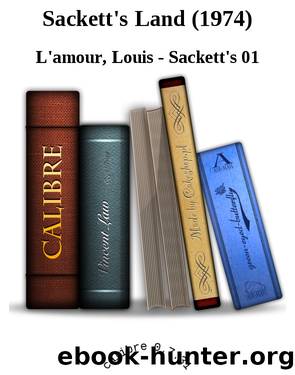Sackett's Land (1974) by Louis - Sackett's 01 L'amour

Author:Louis - Sackett's 01 L'amour [L'amour, Louis - Sackett's 01]
Format: mobi
Published: 2010-12-12T06:26:52.781000+00:00
Chapter 10
My first realization, after an immediate stab of fear, was that the Indians wore no paint. There were stories enough in England about Indians painting for war.
"Put your weapons out of sight," I said, "below the gunwhales. I think they are peaceful."
The canoes slowed their pace, gliding down to us, and then a hand lifted, palm outward, and I recognized Potaka.
"It is my friend," I explained.
Rufisco snorted. "No Indian is your friend," he said. "Keep your gun handy."
I lifted my hand in a sign of peace, and Potaka glided close. If he saw the guns he made no sign of it, nor showed it by gesture or expression. "You come to village?"
"We come," I said.
"Good!"
He shouted to the others and they turned their canoes with a deft, easy maneuver and ranged alongside us, before and aft.
Sunlight sparkled on the river as the clouds scattered before a warm south wind. Beside us, the graceful birchbark canoes glided easily through the water, the copper arms of the Indians moving in unison.
It was no small journey we had undertaken. Now they led the way, and we kept pace, certain only that we had small choice. Their attitude was friendly, but how could we know how genuine it was?
At night we camped ashore, and their hunters brought in meat in plenty. Good venison it was, such as a man might not have in England without poaching on the estate of some great lord.
The Indians were of short stature, and only a few of them were muscular except with the long, lean muscles that indicate the runner. At wrestling I had no doubt I could best any one of them, perhaps any two.
They talked much among themselves, and laughed a lot.
When we reached their village we found it was extensive, many huts of wattle and daub construction, surrounding an open field.
All were busy, and they seemed to have a considerable store of grain. Potaka told me they had three harvests each year and traded with less industrious tribes nearby. There was much dressing of skins, parching of acorns, and gathering of herbs from the forest.
Several times Potaka showed me men who had been injured in battle, occasionally with tribes of Indians, but usually with the "Espanish," whose northward movement they had attempted to stop.
They were avid for trade, but we were cautious, telling them they must await the coming of our ship for extensive trade, that we had but little. We began cautiously enough, displaying only a few articles. I was surprised, for they were an industrious folk and wanted needles, knives and axes more than beads and fripperies.
On the first day we traded but little, and when the feasting began we contributed from our small store. Potaka made a great speech, which he translated in part as an account of his warfare on the side of the English against the Spanish, a speech he had no doubt made before, but which his fellows cheered lustily.
We talked much of the land about us, and Potaka traced routes on the ground, using his finger or a twig to trace in the dirt.
Download
This site does not store any files on its server. We only index and link to content provided by other sites. Please contact the content providers to delete copyright contents if any and email us, we'll remove relevant links or contents immediately.
Twisted Games: A Forbidden Royal Bodyguard Romance by Ana Huang(2523)
The Push by Ashley Audrain(2252)
Den of Vipers by K.A Knight(2179)
Win by Harlan Coben(2050)
Echo by Seven Rue(1875)
Leave the World Behind by Rumaan Alam(1709)
Beautiful World, Where Are You: A Novel by Sally Rooney(1614)
Midnight Mass by Sierra Simone(1574)
Iron Widow by Xiran Jay Zhao(1471)
The Four Winds by Hannah Kristin(1457)
Baby Bird by Seven Rue(1415)
The Warrior's Princess Prize by Carol Townend(1402)
Undercover Threat by Sharon Dunn(1401)
Bridgertons 2.5: The Viscount Who Loved Me [Epilogue] by Julia Quinn(1393)
Sister Fidelma 07 - The Monk Who Vanished by Peter Tremayne(1339)
Snowflakes by Ruth Ware(1233)
Vanessa Yu's Magical Paris Tea Shop by Roselle Lim(1215)
The Golden Cage by Camilla Lackberg(1185)
The Midwife Murders by James Patterson(1147)
